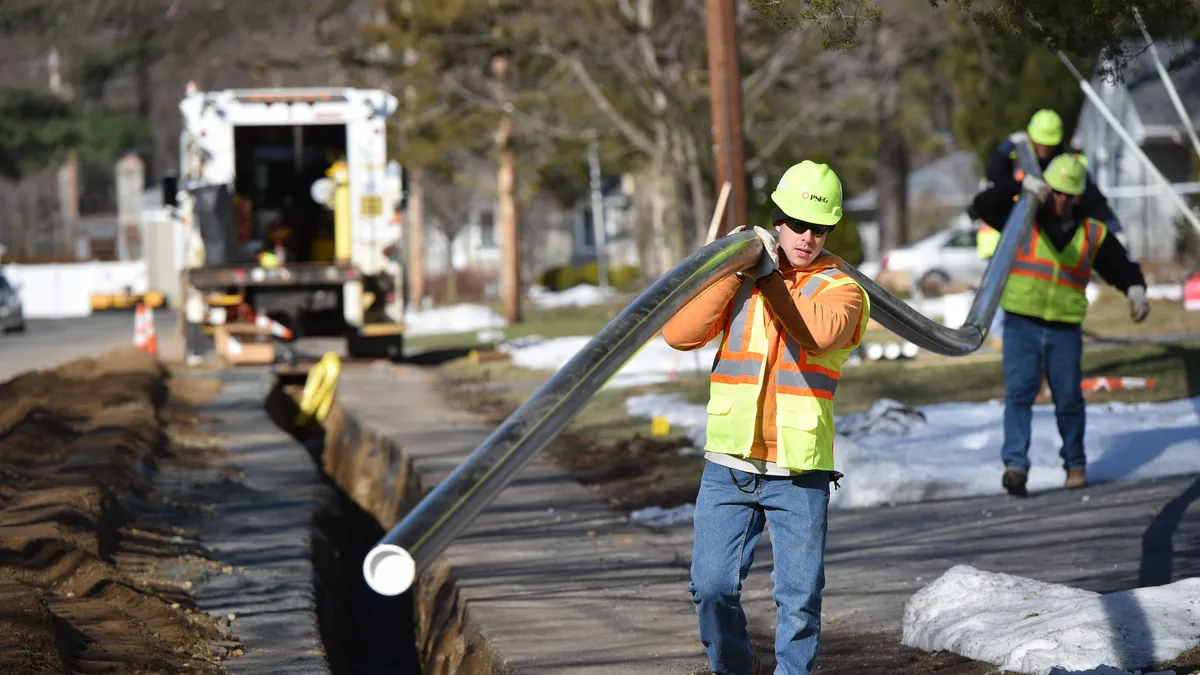Dive Brief:
- Massachusetts regulators on Wednesday required National Grid to implement a slate of new safety protocols and have a certified professional engineer sign off on all pipeline work.
- The new requirements, which the Department of Public Utilities calls "comprehensive," are a response to an October overpressurization incident in Woburn, Massachusetts. Following the overpressurization, the DPU launched a review of the utility's safety practices and put a work moratorium in place.
- National Grid's mistake was brief and had a relatively minor impact on customers, but it happened on the heels of a deadly series of explosions on the Columbia Gas system that killed one and injured 10 while setting fire to 70 homes.
Dive Insight:
National Grid has a queue of new customers awaiting service hookups, but the utility says it has put those on hold until it can clarify its understanding of the DPU's directive.
"We will not be performing new service connection work in Massachusetts at least until we are able to validate with the DPU that we are correctly interpreting the new requirements," the company said in an emailed statement.
The DPU's directive includes several requirements National Grid will need to satisfy before doing any non-emergency work:
- National Grid must use task-specific operating procedures that give step-by-step instructions for any projects conducted.
- The utility will be required to obtain approval of a certified professional engineer in advance of any work taking place in their distribution territory.
- National Grid must impose stricter standards on employee qualifications, "to ensure public safety," the department said.
The DPU is also requiring National Grid to have an inspector on location for work that could lead to abnormal pressurization until this review is complete.
"After reviewing National Grid's safety practices, we are proud to announce new gas pipeline protocols that will hold the company to an unprecedentedly high standard," DPU Chair Angela O'Connor said in a statement.
Requiring the stamp of a certified professional engineer on any non-emergency pipeline work was a recommendation made by the National Transportation Safety Board, following the incident. In addition, Republican Gov. Charles Baker's administration has filed legislation that would impose the engineer sign-off requirement as well.
The employee-qualification requirements mean National Grid must now ensure employees with greater experience are working on its distribution system. The DPU is requiring five years of experience for work on low-pressure service lines, 10 years of experience for work on intermediate-pressure service lines and 15 years of experience for work on high-pressure lines.
National Grid is still determining how to move forward.
"The company is reviewing the department's letter and will be working with the administration to fully understand the scope of the new requirements," National Grid said. "We will be requesting further clarification from the DPU to ensure we can meet all expectations set forth in its letter."
National Grid declined to elaborate on its clarification requests, saying "we won't be commenting beyond the statement for the time being."
It is unclear how much impact the utility's work stoppage will have for the time being: some municipalities have moratoriums on non-emergency work during winter months, while other moratoriums are in place due to a labor dispute.














